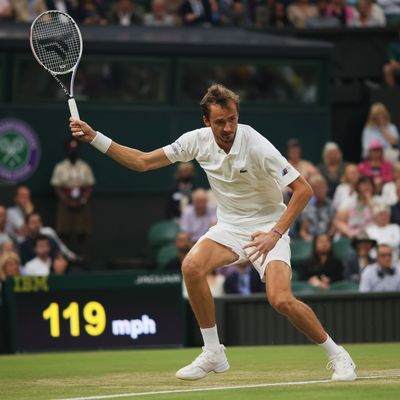
Wimbledon, the most prestigious tennis tournament in the world, announced on Wednesday that it would ban all Russian and Belarusian players from competing this year, becoming the most high-profile sports event to take such a stand on individual athletes amid the Russian invasion of Ukraine, which Belarus supports. The All England Club, which hosts Wimbledon, said in a statement that it could revisit its decision “if circumstances change materially between now and June,” when the tournament begins.
The rule is hardly some symbolic gesture. On the men’s side, Russians in the top 32 — the cutoff for seed qualification — include the current No. 2–ranked player, U.S. Open defending champion Daniil Medvedev, and the No. 8, Andrey Rublev. On the women’s side, six of the top 32 are from those two countries, including the Belarusians Aryna Sabalenka at No. 4. and Victoria Azarenka, once the top-ranked player in the world, at No. 18.
Most bans of Russians in sports since the invasion have taken place at the team level (exceptions include the Boston Marathon) and are considerably easier to justify. The members of Russia’s now-banned World Cup squads, for instance, compete on a global stage specifically to represent a country that is now a pariah in the West.
But tennis players, when they’re not competing in country-versus-country competitions (from which Russians and Belarusians have already been excluded), are generally lone wolves — independent contractors who typically have little to do with the governments of their countries of origin. Many move to tax havens like Monte Carlo or elsewhere in Europe and the U.S., leaving them with little current connection to their home countries. And both the men’s and women’s tennis tours have already stripped Russian and Belarusian players of their flags, erasing any hint of nationalism.
Then there’s the matter of the players’ actual opinions about the war. While few, if any, have directly criticized the Russian government, players including Sabalenka and Azarenka have extended their sympathies to Ukraine and called for peace. During the first week of the war, Rublev memorably wrote “No to war” on a camera. Some actual denunciation of Putin from these players would be nice, and it’s understandable that Ukrainian players — some of whom, like Sergiy Stakhovsky, are now fighting for their country — want more than anodyne statements. But it’s impossible to know to what extent they risk their livelihoods, or even safety, for speaking out.
Punishing average Russians via economic sanctions is morally debatable, but there is a tangible, if perhaps unrealistic, goal: Increase pressure on the Putin regime and turn the tide of public opinion against the war. Punishing a sweeping category of individual athletes, none of whom have given an indication that they support Russia’s invasion, is something different.
Other tournaments don’t look likely to follow suit. The upcoming French Open has announced no such policy, and the U.S. Open says it hasn’t made a decision but seems unlikely to ape Wimbledon. The ATP, which governs the men’s game, issued a statement on Wednesday calling Wimbledon’s decision “unfair” with “the potential to damage the game.” Individual players have also rejected the decision. Novak Djokovic, the iconoclastic Serbian champ barred from the Australian Open for his decision not to get vaccinated, released a statement saying that “when politics interfere with sports, it usually does not turn out well.”






























